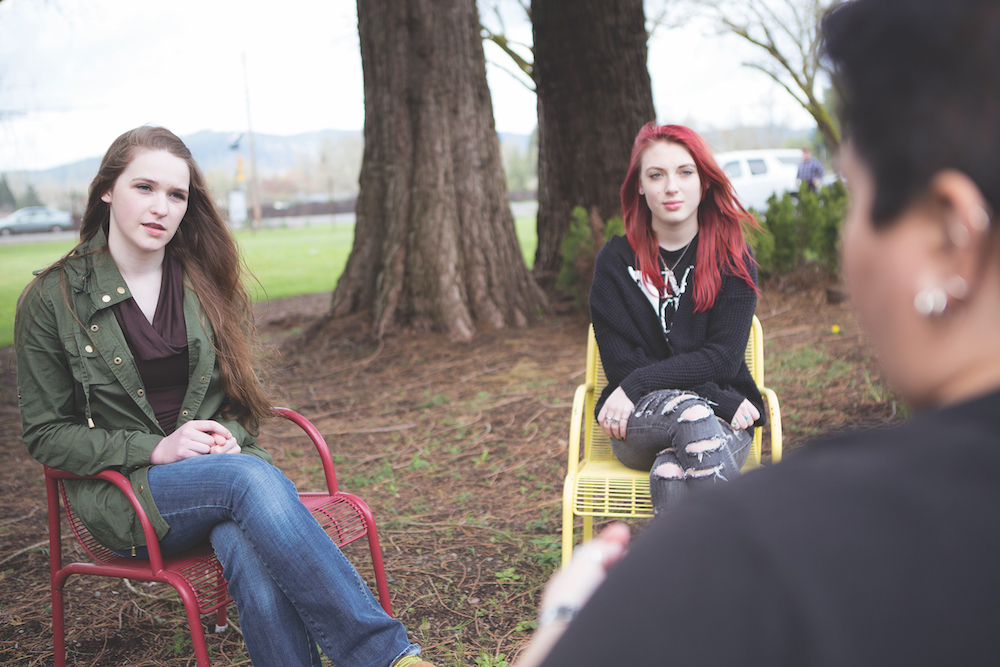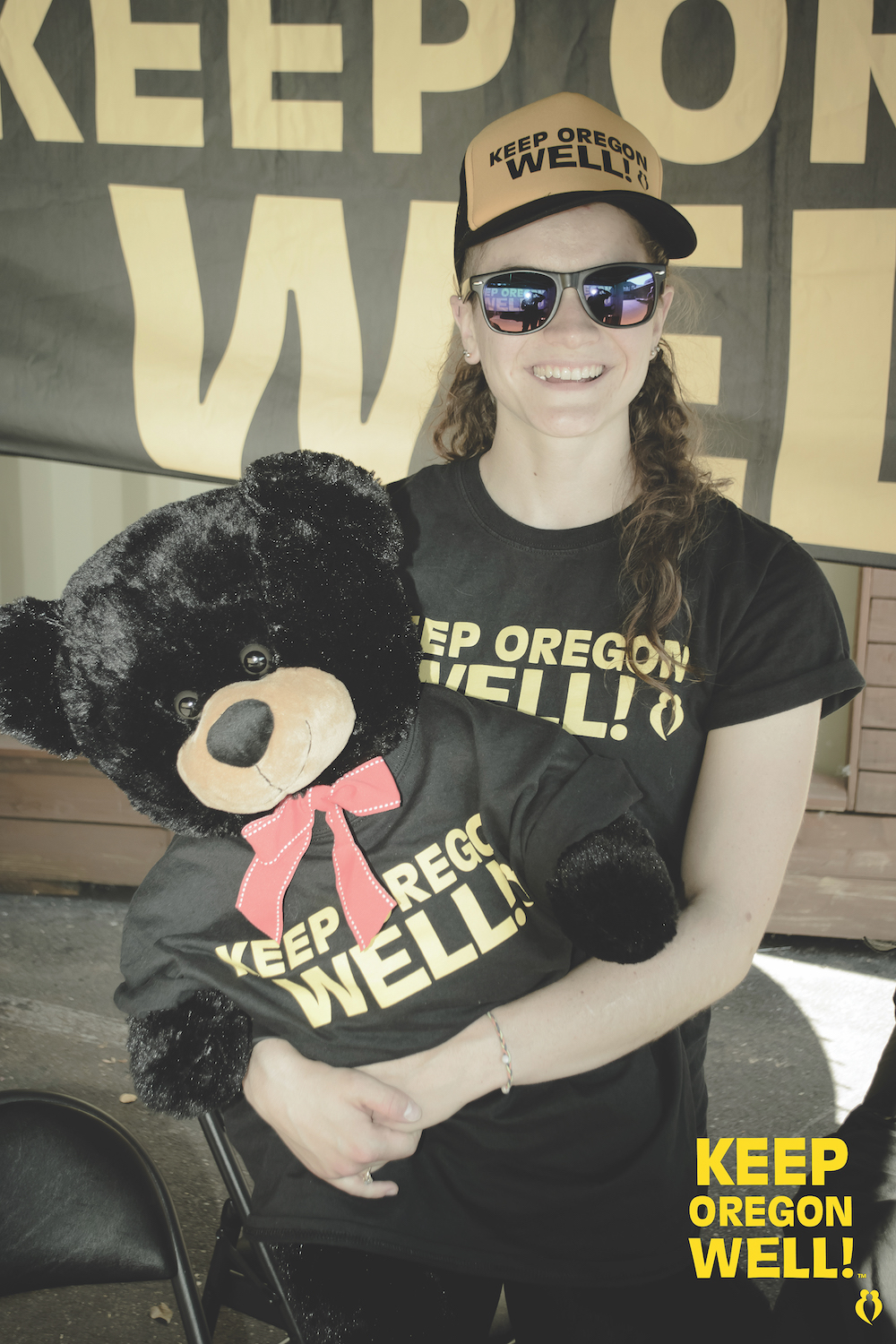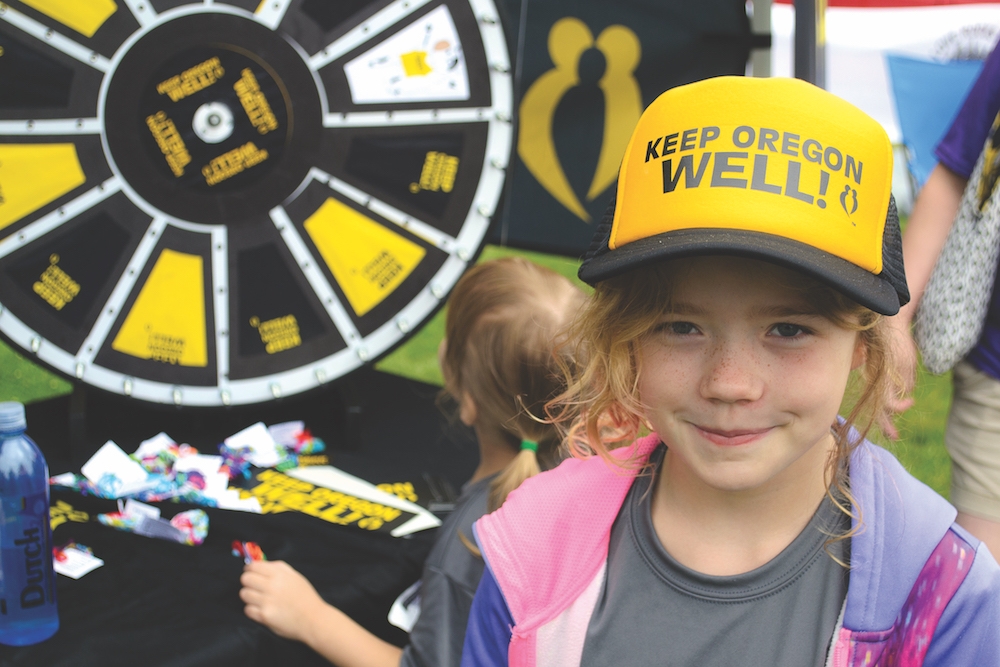Trillium Family Services works fervently to reduce the stigma and prevalence of mental health issues in Oregon.
As a child, Anna Mallery dreaded coming home from school. Home meant dealing with her father, who sexually abused her, and watching him mistreat her mother and two younger siblings. Despite attempts to stand up to him, Anna felt helpless.
This manifested itself in severe anxiety and depression. In middle school, Anna became suicidal and started self-mutilating. “As an 11-year-old girl, you just know it’s very intense and that you don’t want to be here anymore,” she said. Anna was seen by counselors and therapists, but nobody knew how to help her. The therapists told Anna’s mother they were sorry, there was nothing more they could do. She was spiraling out of control—Anna was going to die.
 Anna Mallery receives 2018 Mental Health Hero Award.
Anna Mallery receives 2018 Mental Health Hero Award.
Anna’s mother moved her into a hospital, which wasn’t helping, either. On Anna’s last day there, her mother had news—she found a residential treatment center called the Children’s Farm Home, a program of Trillium Family Services. It was in Corvallis, not far from her family.
Anna stayed for five months, then for two more in Trillium’s Parry Center in Portland. She resented Trillium’s programs at first—but towards the end of her stay, she noticed gradual changes in her mindset and a growing sense of stability. Trillium was teaching Anna tools that wouldn’t fully set in until years later, such as language to express emotions and habits for practicing self-care. And it wasn’t until high school when she realized Trillium’s most profound gift of all: a sense of agency, and the awareness of her own strength and capability. “[I learned that] people are unbreakable,” Anna said. “The recovery for some people could take years or decades. But the resilience of the human spirit is infinite.”
Anna is one of many children who have found healing in Trillium’s care. Caring for youth since 1867, Trillium is Oregon’s largest provider of mental and behavioral health services for kids and families. By focusing on prevention, community, and residential services, its mission is to create a place of safety for every child and family in Oregon.
 Trillium Family Services
Trillium Family Services
Much of society associates mental health with severe cases of mental illness, like suicide or schizophrenia, yet mental health struggles are much more pervasive than that: symptoms could include sudden changes in mood, irritability, inability to process information, or abnormal sleeping patterns. While Oregon has attempted to address these issues, mental health programs and services continue to be underfunded. Additionally, as of 2017, we have over 31,000 non-profits, 61% being healthcare-related— the outcomes do not reflect the intentions. Trillium is also working to change that, by bringing people together across sectors to build community resilience.
In 2016, Oregon ranked dead last in prevalence of mental health cases (we’ve since risen to 44th). The Substance Abuse and Mental Health Services Administration reported that 1 in 4 Oregonians struggle with mental health issues. We have some of the highest rates of youth suicide in the entire country and hold the third-worst graduation rates (as of 2016). “When you walk through downtown Portland, you can see our lack of attention in helping people who are traumatized,” said Kim Scott, CEO of Trillium Group, who has been with the organization since 1979. “It shows we aren’t taking care of our community in some really profound ways.”
 Trillium Family Services
Trillium Family Services
Beyond affecting us emotionally, mental health carries a significant economic impact. According to the Depression Center at the University of Michigan, depression is a leading cause of lost productivity in America, costing an annual $44 billion to employers; the World Health Organization reports depression and anxiety cost the world nearly $1 trillion annually.
While these cases require acute care, Trillium seeks to prevent issues from happening altogether. Instead of being a “safety net” for those already suffering, they ask, “how can we become proactive in handling mental health?”
In 2014, Trillium launched Keep Oregon Well, a multi-media advocacy campaign that’s part of the national Mental Health Matters movement. By bringing together high profile athletes, musicians, and radio and TV personalities, the campaign normalizes the conversation around mental health and encourages those affected to seek treatment. The campaign has reached 1.5 million Oregonians weekly since its inception and continues to accumulate support.
Keep Oregon Well also strives to build a trauma-informed community: rather than asking people “what’s wrong with you?”, the model encourages asking, “what happened to you?” This simple shift in language can profoundly change the way we view and approach those affected by trauma—empowering the individual and changing the perspective from deficit-based to one of understanding.
 Keep Oregon Well Youth Advocate Addyson Lynn.
Keep Oregon Well Youth Advocate Addyson Lynn.
Trillium’s prevention has taken a more integrated approach as well. In 2001, the organization partnered with Oregon school districts to place a Master’s level clinician, called a “Prevention Specialist”, within schools. This specialist is hired from the local community, ensuring a culturally-informed lens for dealing with students, and essentially becomes “the eyes and ears” of the school. Beyond bringing a clinical perspective, the specialist also has access to Trillium’s extensive resources.
By being present, the specialist can catch things that might otherwise go unnoticed. When problems arise, they have the entire context and can intervene more effectively. It’s been a powerful tool for stigma reduction as well, letting students know it’s okay to seek help when they’re stressed or dealing with conflicts, rather than letting tension build. “Research has shown that kids are far more resilient to one horrible event, as opposed to more constant daily stressors,” said Jamie Vandergon, President of Trillium Family Services. “Hunger, failing grades, experiencing daily racisist microaggressions – those things wear you down physically and psychologically, far more than a significant, one-time traumatic event.” Trillium is now in 109 schools across the state, from urban to rural settings, with a growing number of schools requesting its presence.
Trillium aims to foster resilience in our children, our families, and our communities. Their work is centered upon a fundamental truth of human nature: with the right help and intervention, people have a remarkable ability to transform themselves.
Anna’s story is a perfect example. With professional care and a healing environment, Anna’s resilience kicked in and she was able to change her life’s trajectory. Anna is now a sophomore at Central Oregon Community College and is pursuing a degree in Psychology. She’ll be the R.A. of her dormitory next year, and plans to lead mental health programs for fellow students.
 Anna Mallery Volunteering at the Keep Oregon Well Advocacy Booth.
Anna Mallery Volunteering at the Keep Oregon Well Advocacy Booth.
Trillium’s vision of improving health and wellness is a collective one, achieved through partnership and collaboration. Most of Trillium’s programs are funded through contracts with regional care coordination organizations (CCO’s), the State of Oregon and commercial insurance contracts. Some of Trillium’s community based programs and initiatives are funded privately—by grants, school districts, and donors.
“Our concept of trauma and mental health goes beyond geography, beyond the urban-rural divide, beyond wealthy versus poor,” said Kim Scott.
Mental health is a universal issue, he says, which affects all of us in some way. And thus it will take all of us to address it, together.
Get Involved: To continue their transformative work, Trillium relies upon donations and volunteer efforts. Visit Trillium’s website (www.trilliumfamily.org) to donate, and visit www.KeepOregonWell.com to learn more about the Keep Oregon Well campaign, and to ‘Take the Pledge’ and help fight stigma surrounding mental health.
Brand stories are paid content articles that allow Oregon Business advertisers to share news about their organizations and engage with readers on business and public policy issues. The stories are produced in house by the Oregon Business marketing department. For more information, contact associate publisher Courtney Kutzman.




